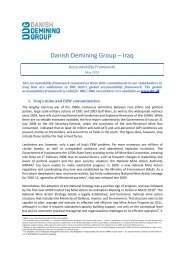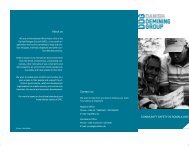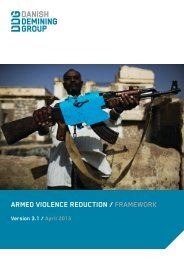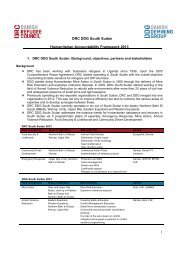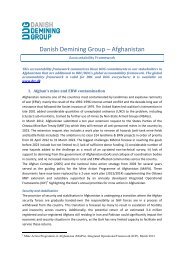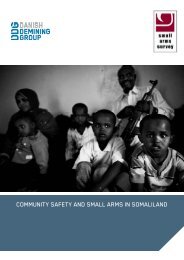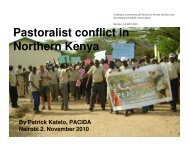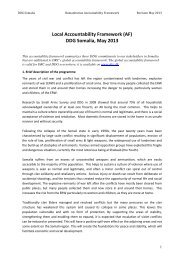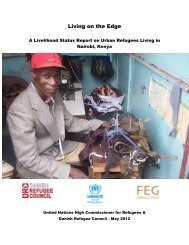24 DRC / DANISH REFUGEE COUNCILsolutions linked to <strong>the</strong> plight of IDPs in Afghanistan. Given <strong>the</strong> political context in KIS, <strong>the</strong> problem ofaccess to land and shelter is <strong>the</strong>refore not directly related to this study, which looks at means toefficiently address <strong>the</strong> current needs of IDPs in KIS. Only 9% of respondents stated <strong>the</strong>y would useunconditional cash assistance to build shelters if provided with cash grants, and none mentioningrenting of a new dwelling: though upgrading of existing housing conditions was mentioned as a direneed, respondents prefer focusing on what <strong>the</strong>y perceive as acute immediate needs, such as food,energy, and unexpected illness.This is however an indication of high vulnerability in resilience to shocks, with subsequent inability toconsider measures that would only bear fruit to improve <strong>the</strong>ir conditions in <strong>the</strong> longer-term.“Our children suffer from various diseases in <strong>the</strong> hot season because we live in tents, if we receivedassistance for shelter, it would be good. So we have shelter problems.”- Female FGD Nasaji Karte Now, 25 years oldChild protection: Child protection has been highlighted as one of <strong>the</strong> main concerns for IDPs 24 .Health issues mentioned above have a direct impact on child protection issues. This section will<strong>the</strong>refore focus on two o<strong>the</strong>r aspects of child protection of serious concern in <strong>the</strong> KIS: education andchild labour.“My children don’t go to <strong>the</strong> public school because <strong>the</strong> school didn’t accept because <strong>the</strong>y told usthat our clo<strong>the</strong>s are dirty and old”- Male FGD Hewadwal apartments, 50 years old“I don’t feel comfortable in this area, because <strong>the</strong> main community threatens us, and tell us, you callus dirty people, and act violently to our children “- Female FGD Sharak- e Police, 40 years oldEducation: 43% of <strong>the</strong> surveyed individuals <strong>report</strong>ed children in <strong>the</strong>ir household wereattending school. Most of <strong>the</strong> children in <strong>the</strong> households surveyed were mentioned not to beable to attend school for various reasons. One of <strong>the</strong> crucial reasons mentioned byrespondents is <strong>the</strong> lack of capacity of <strong>the</strong>ir households to purchase school material. In a fewcases, respondents mentioned children in <strong>the</strong>ir household could not attend school because<strong>the</strong>y had to work to contribute to <strong>the</strong>ir family’s income. Past research has shown IDP childrentend to be discriminated in access to school, and stigmatization was also mentioned as anobstacle to school attendance in FGDs in <strong>the</strong> visited sites. Physical access to educationfacilities or enrolment <strong>the</strong>refore does not constitute in <strong>the</strong>mselves a sign that children areeffectively attending school. Variations according to camps in <strong>report</strong>s of school attendancewere noticed in <strong>the</strong> results of <strong>the</strong> survey: <strong>the</strong> highest percentages of households who send<strong>the</strong>ir school to children are located in Charahi Qambar (77.5%), Nasaji Bagrami (77.5%),Bagh- e Daud (73%) and Kabul Nandari (65%). In Shahrake Police 40% of <strong>the</strong> surveyedhouseholds <strong>report</strong>ed sending <strong>the</strong>ir children to school and <strong>the</strong> percentage drops to 22.5% inBlock hai Qasaba. However, 47% of <strong>the</strong> respondents who stated not sending <strong>the</strong>ir childrento school <strong>report</strong>ed being willing to send <strong>the</strong>m if <strong>the</strong>y were assisted in <strong>the</strong> form of cash, whileadditional focus groups in Block hai Qasaba and Shahrake Police confirmed that: 1) absenceof or difficult access to schools; 2) financial constraints; and 3) socio-cultural barriers were<strong>the</strong> main reasons for poor school attendance.Child Labour: The percentage of working children in <strong>the</strong> households surveyed in our samplewas mentioned to be approximately 4%. However, both past research 25 and observationfrom <strong>the</strong> field showed children in <strong>the</strong> KIS are involved in contribution to <strong>the</strong>ir household’sincome. The low percentage of child labour <strong>report</strong>ed could <strong>the</strong>refore be attributed tounder<strong>report</strong>ing of child- protection issues, including child labour 26 . Working children in <strong>the</strong>24 NRC/IDMC/JIPS/SAMUEL HALL CONSULTING (2012), Challenges of IDP protection in Afghanistan: Research study on <strong>the</strong>protection of internally displaced persons in Afghanistan.25 Ibid.26 Ibid.
Car washing, shoepolishing, etc.Street VendingWorking in informalenterprisesWorking in brick kilnsBeggingDaily workerDrivingCASH PROGRAMME REVIEW FOR IDPs IN KABUL INFORMAL SETTLEMENTS 25surveyed households were <strong>report</strong>ed to be mainly engaged in car washing and shoe polishing(67%) street vending (14%), and “informal enterprises” such as auto mechanics, carpentry,or carpet weaving (11%). Begging <strong>report</strong>edly represented 2% of working children’s activities,though sending one’s child to beg it was mentioned on several occasions throughout <strong>the</strong>qualitative fieldwork as a coping mechanism for generating income, or ga<strong>the</strong>ring food andfuel when households are face with difficulties in meeting <strong>the</strong>ir basic needs. Specificcommunity characteristics might fur<strong>the</strong>r need to be taken into account in <strong>the</strong> design ofprogrammes, including awareness about child labour and education for instance.Communities like Jogis 27 in Charahi Qambar, for instance, might practice sending <strong>the</strong>irchildren to school, while some Kuchi communities rely on women and children for keepinglivestock.Graph 5: Types of child labour (%)100908070605040302010067,187514,0625 10,93753,1250 1,5625 1,5625 1,5625Picture 2: Cycle of life in Kabul (Photo: Samuel Hall, 2012)27 UNICEF, Samuel Hall (2011), Jogi and Chori Frosh Communities.



